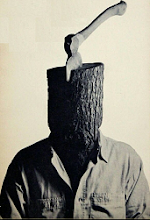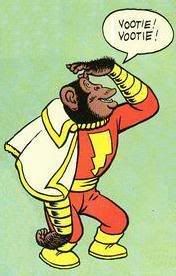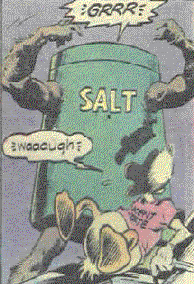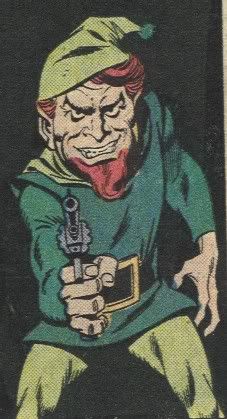Putting Malcolm on the Ten: "Birth of a Nation"
The future of comics, to yers truly, can be found in the margins. The Big Two publishers of Marvel and DC are, artistically, treading water. (Yes, DC maintains a boutique imprint called “Vertigo,” but I can’t bring myself to care. With the exception of Human Target, which is one of my very favorite books. I digress.) More importantly, most blogs out there cover the mainstream already. Is there anything new I can say about Identity Crisis or All-Star Batman and Robin?
In the interests of saying something different, I’ve decided to look over a couple of works outside of the mainstream of comicdom.
Crown Publishing recently put out a true graphic novel, entitled Birth of a Nation. Birth was written by Aaron McGruder and Reginald Hudlin, and illustrated by Kyle Baker. By “true graphic novel,” I mean that it is not a collection of individual comic books and stuck in a book binding, but rather a full story told graphically.
Birth is a political satire based upon the presidential election of 2000. The story begins on election day. Due to a mistake that seemed very much intentional, a thousand residents of East St. Louis, an impoverished city that is ninety-eight percent black, were tagged as felons and not allowed to vote in the election. These barred votes proved pivotal, as the candidate based on George W. Bush won the state of Illinois, and thus the election, by a few hundred votes.
After a cascading series of events rains disappointment upon disappointment upon the city, the mayor, Fred Fredericks, declares that East St. Louis, historically one of the roughest and nastiest in the country, has seceded from the United States. Mayhem ensues.
For the first twenty pages or so, the story feels more than a little like a cartoon civics lesson. The protagonist of the story, Fredericks, begins as an uncomplicated good man. Which, sadly, is a little boring. He rallies citizens to vote, he helps folks with their garbage (necessary due to problems with the garbage companies – a real and common problem in East St. Louis), and he has a rapport with various members of the city. A guy you’d love to have as a neighbor or a mayor, but not a compelling read.*
Once the Republic of Blackland is created, the story becomes a lot more interesting. McGruder and Hudlin showed a solid grasp of history and politics when they charted the future of the new nation. The parties involved act as one would expect them to act. The US reaction of freezing assets and starting embargoes made sense; the Blackland response of creating a money-laundering economy did as well.
The authors did not fall into the trap of presuming all would go well in Blackland, either. To protect the city, the mayor is forced to ally with the biggest gang figure around and employ thugs as soldiers. As a result, the military becomes a potential threat as well as a protector. The future of the city also becomes a sticking point between a multimillionaire who financed the initial secession, and the mayor, as the former is in it for personal power and wealth, while the latter wants what’s best for the fledgling country.
As the country emerges upon the world stage, the authors insert a number of jokes to lighten the mood. The Blackland flag is red, black, and green...with a picture of a white Jesus in the middle. Why? Because the only people who showed up to the civic meeting where the design was settled were old folks. As the mayor's aide pointed out, old black folks love the Jesus, and white is how they know him. The melody for the national anthem comes from the theme to “Good Times.” Their currency carries the face of black icons: MLK on the one dollar bill, the president of Blackland on the five, Malcolm X on the ten.
Only after finishing the book did I catch the gag. Malcolm on the ten. Heh.
Birth of a Nation isn’t a masterpiece, but it’s damn good. It maintains enough narrative drive to keep the story lively, the characters are just individual enough to hold readers’ interest, and the level of exaggeration keeps the story funny but not ridiculous.
Baker’s art was cartoony and charming. His placement and shaping of panels was downright inspired. He also had a strong Sergio Aragones flavor, which is a huge plus (to me, anyway). The lines were loosely drawn and well-placed.
What makes the novel work is its humanism. The creators understood that people have multiple allegiances and conflicting desires. They avoided the temptation to create figures of untrammeled good or pure evil (with the exception of a few Air Force officers), and created a story that juggled the often-conflicting desires of the characters involved.
My only major complaint? The portrayal of the Secretary of State, an analogue of Colin Powell. Birth portrays him as a forceful statesman, the sole sane grownup in the White House. History has not borne this out. He’s an intelligent man, no doubt, and at least mostly sane, but the true Powell lacks the fire and decisiveness of his Birth of a Nation counterpart. This book’s vision of him is what we wish Powell were, not what he is.
On the other hand, it captured Dick Cheney perfectly.
*As a resident of the Washington DC area, oh man would I love to have this guy as mayor. Look at the last few we’ve had: “Marion Barry the Crackhead” followed by “Tony Williams the Absentee Mayor Who Screws His City for Baseball.” Get me Fred Fredricks now! I don’t care if he’s a cartoon! The local motto: “Washington city politics – Hopeless, But Not Serious.”
In the interests of saying something different, I’ve decided to look over a couple of works outside of the mainstream of comicdom.
Crown Publishing recently put out a true graphic novel, entitled Birth of a Nation. Birth was written by Aaron McGruder and Reginald Hudlin, and illustrated by Kyle Baker. By “true graphic novel,” I mean that it is not a collection of individual comic books and stuck in a book binding, but rather a full story told graphically.
Birth is a political satire based upon the presidential election of 2000. The story begins on election day. Due to a mistake that seemed very much intentional, a thousand residents of East St. Louis, an impoverished city that is ninety-eight percent black, were tagged as felons and not allowed to vote in the election. These barred votes proved pivotal, as the candidate based on George W. Bush won the state of Illinois, and thus the election, by a few hundred votes.
After a cascading series of events rains disappointment upon disappointment upon the city, the mayor, Fred Fredericks, declares that East St. Louis, historically one of the roughest and nastiest in the country, has seceded from the United States. Mayhem ensues.
For the first twenty pages or so, the story feels more than a little like a cartoon civics lesson. The protagonist of the story, Fredericks, begins as an uncomplicated good man. Which, sadly, is a little boring. He rallies citizens to vote, he helps folks with their garbage (necessary due to problems with the garbage companies – a real and common problem in East St. Louis), and he has a rapport with various members of the city. A guy you’d love to have as a neighbor or a mayor, but not a compelling read.*
Once the Republic of Blackland is created, the story becomes a lot more interesting. McGruder and Hudlin showed a solid grasp of history and politics when they charted the future of the new nation. The parties involved act as one would expect them to act. The US reaction of freezing assets and starting embargoes made sense; the Blackland response of creating a money-laundering economy did as well.
The authors did not fall into the trap of presuming all would go well in Blackland, either. To protect the city, the mayor is forced to ally with the biggest gang figure around and employ thugs as soldiers. As a result, the military becomes a potential threat as well as a protector. The future of the city also becomes a sticking point between a multimillionaire who financed the initial secession, and the mayor, as the former is in it for personal power and wealth, while the latter wants what’s best for the fledgling country.
As the country emerges upon the world stage, the authors insert a number of jokes to lighten the mood. The Blackland flag is red, black, and green...with a picture of a white Jesus in the middle. Why? Because the only people who showed up to the civic meeting where the design was settled were old folks. As the mayor's aide pointed out, old black folks love the Jesus, and white is how they know him. The melody for the national anthem comes from the theme to “Good Times.” Their currency carries the face of black icons: MLK on the one dollar bill, the president of Blackland on the five, Malcolm X on the ten.
Only after finishing the book did I catch the gag. Malcolm on the ten. Heh.
Birth of a Nation isn’t a masterpiece, but it’s damn good. It maintains enough narrative drive to keep the story lively, the characters are just individual enough to hold readers’ interest, and the level of exaggeration keeps the story funny but not ridiculous.
Baker’s art was cartoony and charming. His placement and shaping of panels was downright inspired. He also had a strong Sergio Aragones flavor, which is a huge plus (to me, anyway). The lines were loosely drawn and well-placed.
What makes the novel work is its humanism. The creators understood that people have multiple allegiances and conflicting desires. They avoided the temptation to create figures of untrammeled good or pure evil (with the exception of a few Air Force officers), and created a story that juggled the often-conflicting desires of the characters involved.
My only major complaint? The portrayal of the Secretary of State, an analogue of Colin Powell. Birth portrays him as a forceful statesman, the sole sane grownup in the White House. History has not borne this out. He’s an intelligent man, no doubt, and at least mostly sane, but the true Powell lacks the fire and decisiveness of his Birth of a Nation counterpart. This book’s vision of him is what we wish Powell were, not what he is.
On the other hand, it captured Dick Cheney perfectly.
*As a resident of the Washington DC area, oh man would I love to have this guy as mayor. Look at the last few we’ve had: “Marion Barry the Crackhead” followed by “Tony Williams the Absentee Mayor Who Screws His City for Baseball.” Get me Fred Fredricks now! I don’t care if he’s a cartoon! The local motto: “Washington city politics – Hopeless, But Not Serious.”





0 Comments:
Post a Comment
<< Home